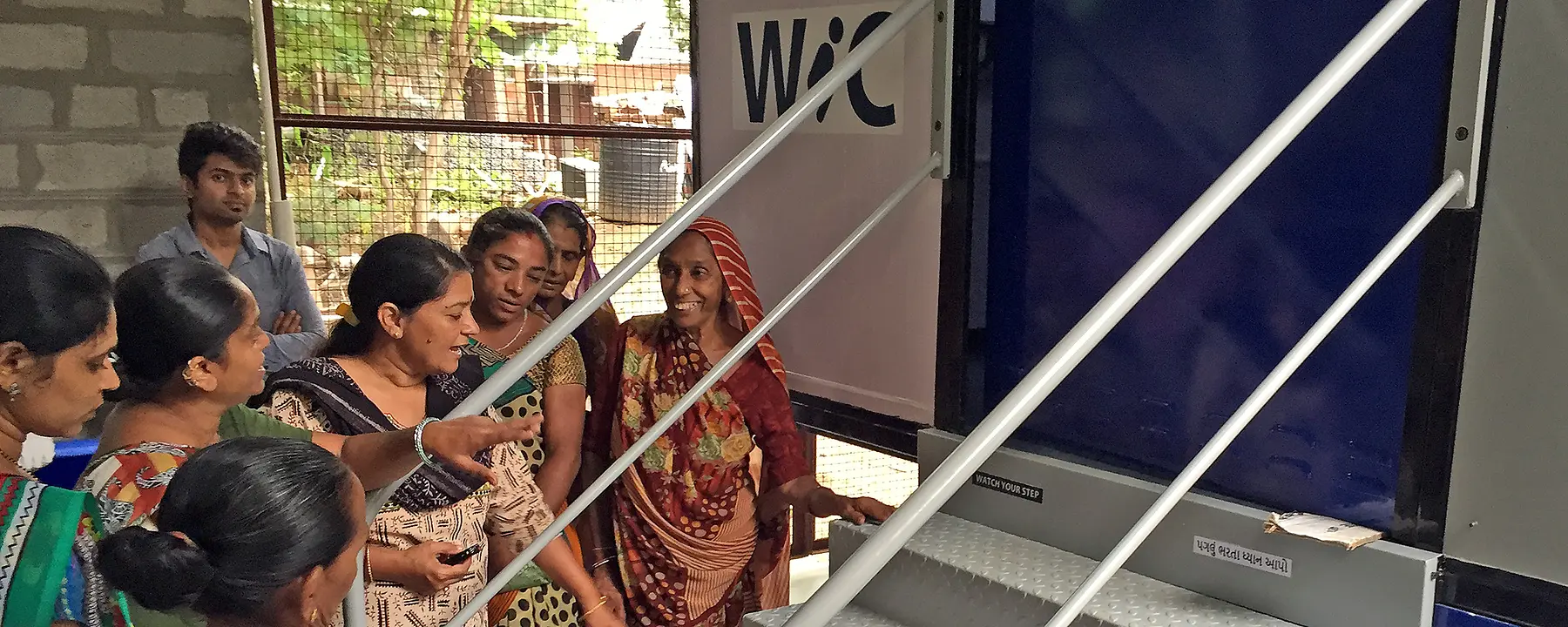Designing a waste treatment system for off-grid sanitation needs
Objective:
Develop a novel waste treatment system designed for use in the places where people need it most.
Approach:
Toilet operates without piped-in water, a sewer connection, or outside electricity—and converts human waste into burnable fuel, stored energy, and disinfected, non-potable water.
Impact:
Testing our technology with hopes it will support significant improvements in public health, quality of life, and the environment in nations around the world.
Around the world, some 2.4 billion people lack access to toilets or improved sanitation, and more than 1 billion people resort to open defecation—a practice that poses significant health and environmental risks. Even in urban areas, more than 2 billion people live without the services or infrastructure for the safe disposal of human waste, which can result in contaminated drinking water. Diarrhea caused by poor sanitation and unsafe water kills more than 300,000 children each year.
Turning Human Waste into Fuel and Disinfected Water
Under grants from the Bill & Melinda Gates Foundation’s “Reinvent the Toilet” challenge, in 2012 we assembled a team of experts to develop a novel waste treatment system designed for use in the places where people need it most. This toilet operates as a closed loop, with technology to treat and reuse liquids and generate power via a chemical-free combustion process.
Our toilet is designed to operate off-grid—without piped-in water, a sewer connection, or outside electricity—and converts human waste into burnable fuel, stored energy, and disinfected, non-potable water, all for an operating cost of less than US $.05 per day. As it stands now, the system runs on the equivalent of two car batteries; in the future, a unit could be potentially powered by solar panels.
Testing the Toilet in Community Settings
In 2014, we demonstrated a prototype of our toilet in New Delhi, where the response was overwhelmingly positive. Users, researchers, and government officials liked how our toilet burns solid waste, harvests energy from feces, and uses electrochemical disinfection rather than chemicals or additives. Participants also saw tremendous value in the water savings achieved through low flush volume and the use of recycled and disinfected liquid for flush water, as well as our commitment to integrate menstrual hygiene management processes into the interface and process technology.
In September 2016, we began testing our first prototype toilet in Ahmedabad, India; this unit operates on a university campus and demonstrates a use case for an institutional setting. In 2017, our team deployed two additional prototypes in locations with different use profiles. In Durban, South Africa, we are partnering with a local government water utility to test a unit in a low-income urban community’s shared toilet, shower, and washing station, referred to as a community ablution block. And in Coimbatore, in the southern Indian state of Tamil Nadu, we are partnering with a private-sector company, a spinning mill, to test the toilet near a female workers’ dormitory. This will demonstrate the usability of our system in a shared toilet setting and facilitate efforts to incorporate women’s sanitation needs into the design.
Partnering with the U.S. Army on Forward-Operating Military Bases
Forward-operating bases are temporary bases, often without running water or electricity, established to support tactical military operations. More than sixty percent of all U.S. military injuries in Iraq and Afghanistan involved personnel supporting base operations, which included removing human waste. Currently, human waste is either trucked out of temporary bases, which is dangerous to the lives of those transporting the waste, or the waste is burned on site, which is damaging to the environment.
In 2017, we began working with the U.S. Army Natick Soldier Research, Development, and Engineering Center to adapt our mobile, low-maintenance, self-sustaining, off-grid toilet system to serve military personnel stationed at forward-operating bases. This system, called TOWR, is the first of its kind to be developed that contains no biologics or bacteria and thus can safely be transported across international boundaries. Like its counterparts in India and South Africa, each TOWR prototype deployed by the army can support 10 to 50 people (with the goal to scale up capacity) and requires minimal maintenance.
Improving Public and Environmental Health and Quality of Life
Community toilet blocks and forward-operating bases only scratch the surface of our off-grid toilet system’s potential. This toilet could also be deployed in national disaster recovery programs, in refugee camps, or in remote locations off the electric grid. The TOWR configuration is ideal for construction sites in low-resource areas around the world, where migrant workers often stay for 18 to 24 months with only pit latrines, and the system is also suitable for festivals, tourist sites, and other large civic gatherings.
Ultimately, our aim is to perfect the development of a waste treatment system that can be integrated into poor rural and urban communities and has the potential to be adapted to other uses as well. We are working to ensure that our demonstration models align with cultural norms and will be accepted, and used, by the people who need them most. In so doing, we hope our technology will support significant improvements in public health, quality of life, and the environment in nations around the world.
- Bill & Melinda Gates Foundation
- Duke University
- Colorado State University
- NASA Ames Research Center
- U.S. Naval Research Laboratory

